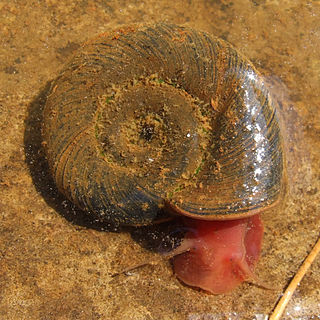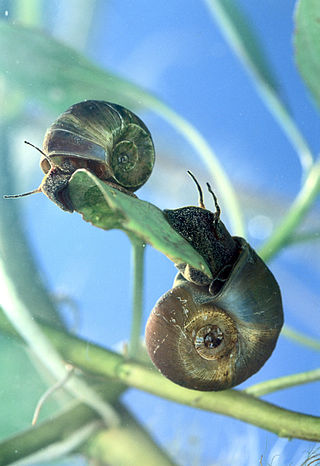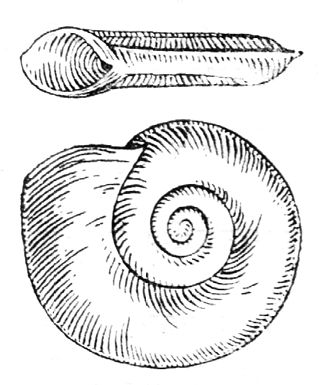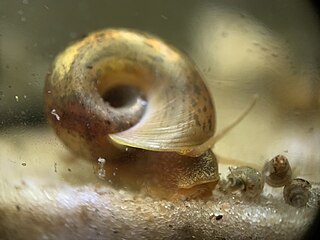
The term ramshorn snail or ram's horn snail is used in two different ways. In the aquarium trade it is used to describe various kinds of freshwater snails whose shells are planispiral, meaning that the shell is a flat coil. Such shells resemble a coil of rope, or a ram's horn. In a more general natural history context, the term "ramshorn snails" is used more precisely to mean those aquatic pulmonate gastropod mollusks in the family Planorbidae that have planispiral coiled shells.

Planorbidae, common name the ramshorn snails or ram's horn snails, is a family of air-breathing freshwater snails, aquatic pulmonate gastropod molluscs. Unlike most molluscs, the blood of ram's horn snails contains iron-based hemoglobin instead of copper-based hemocyanin. As a result, planorbids are able to breathe oxygen more efficiently than other molluscs. The presence of hemoglobin gives the body a reddish colour. This is especially apparent in albino animals.

Planorbarius corneus, common name the great ramshorn, is a relatively large species of air-breathing freshwater snail, an aquatic pulmonate gastropod mollusk in the family Planorbidae, the ram's horn snails, or planorbids, which all have sinistral or left-coiling shells.

Anisus vorticulus is a species of minute, air-breathing, freshwater snail, an aquatic gastropod mollusk in the family Planorbidae, the ramshorn snails.

Planorbella is a genus of freshwater air-breathing snails, aquatic pulmonate gastropod mollusks in the family Planorbidae, the ram's horn snails, or planorbids, which all have sinistral, or left-coiling, shells.
Bulinus camerunensis is a species of small air-breathing freshwater snail with a sinistral shell, an aquatic pulmonate gastropod mollusk in the family Planorbidae, the ramshorn snails and their allies.
Bulinus nyassanus is a species of small air-breathing freshwater snail with a sinistral shell, an aquatic pulmonate gastropod mollusk in the family Planorbidae, the ramshorn snails and their allies. This species is endemic to Lake Malawi in Africa, where found both in shallow and relatively deep water. Its shell generally reached a size of up to around 14 mm × 11 mm.

Leptoxis ampla, common name the round rocksnail, is a species of freshwater snail with a gill and an operculum, an aquatic gastropod mollusc in the family Pleuroceridae.

The painted rocksnail is a species of freshwater snail with a gill and an operculum, an aquatic gastropod mollusk in the family Pleuroceridae.
†Neoplanorbis carinatus was a species of air-breathing freshwater snail, an aquatic pulmonate gastropod mollusk in the family Planorbidae, the ram's horn snails.

Neoplanorbis is a genus of small, freshwater, air-breathing snails. They are aquatic pulmonate gastropod mollusks in the family Planorbidae, the ram's horn snails.
†Neoplanorbis smithi was a species of small freshwater snail, an aquatic gastropod mollusk in the family Planorbidae, the ramshorn snails. This species was endemic to the United States; it is now extinct. The shells of this species appear to be dextral in coiling, but as is the case in all planorbids, the shell is actually sinistral. In life the shell was carried upside down with the aperture on the right, and this makes it appear to be dextral.
† Neoplanorbis umbilicatus was a species of air-breathing freshwater snail, an aquatic pulmonate gastropod mollusk in the family Planorbidae, the ram's horn snails.

Planorbella magnifica, the magnificent ramshorn, is a species of small, freshwater, air-breathing snail, a pulmonate gastropod mollusc in the family Planorbidae, the ram's horn snails. This species is endemic to the United States.

Planorbis carinatus is species of air-breathing freshwater snail, a pulmonate gastropod mollusk in the family Planorbidae, the ramshorn snails.

Planorbella duryi, common name the Seminole rams-horn, is a species of air-breathing freshwater snail, a pulmonate gastropod mollusk in the family Planorbidae, the ram's horn snails. The species is endemic to Florida and is found frequently in home aquariums.
Bulinus nasutus is a species of tropical freshwater snail with a sinistral shell, an aquatic gastropod mollusk in the family Planorbidae, the ramshorn snails and their allies.











